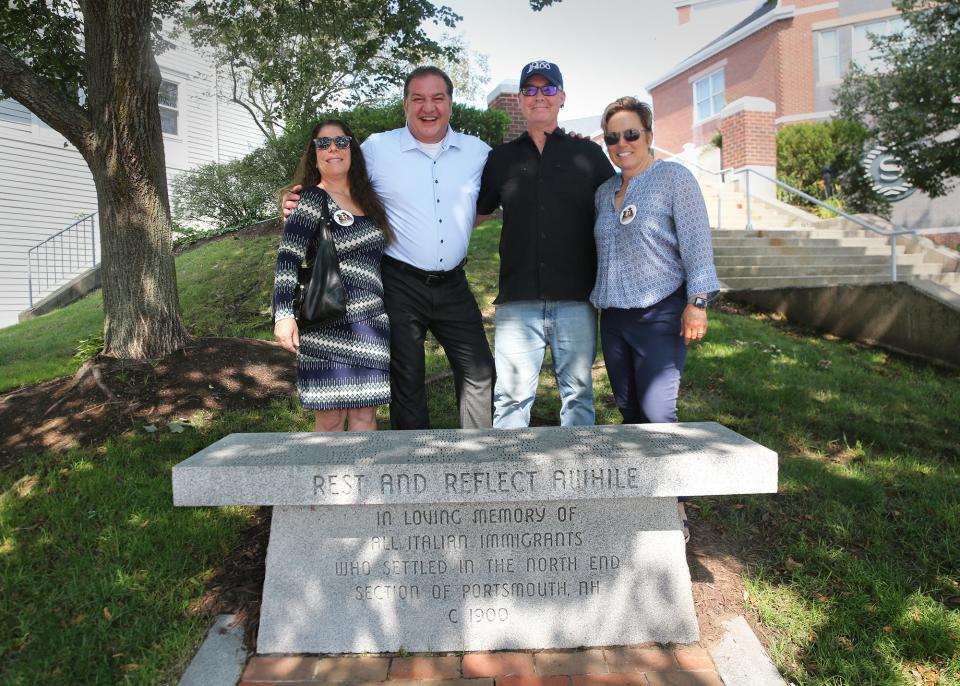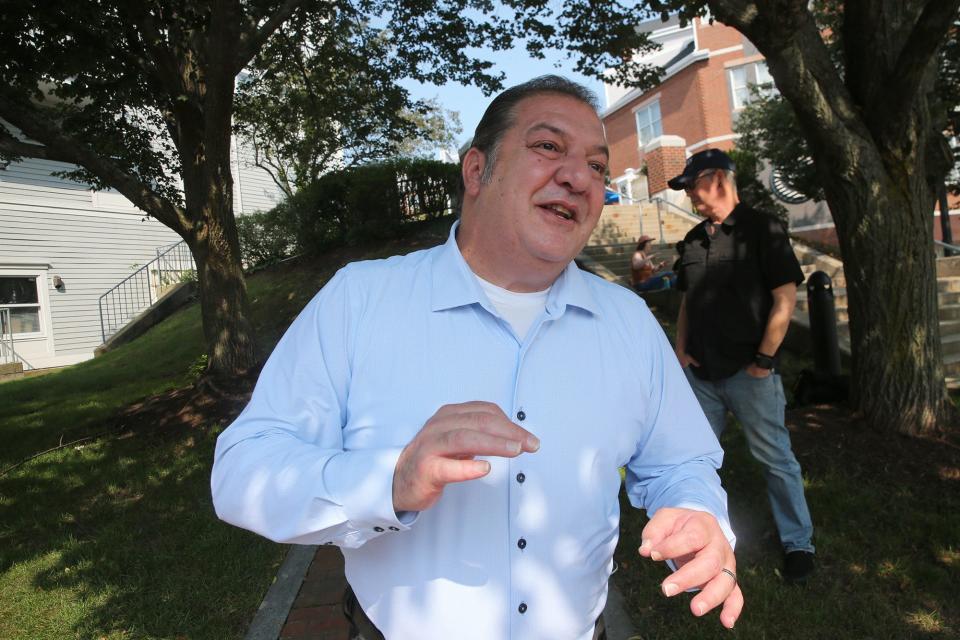Little Italy Carnival to honor Portsmouth's North End heritage, lost to urban renewal
PORTSMOUTH — One of the only physical tributes to the city’s Italian-American heritage — a population uprooted from the old North End neighborhood in the 1960s due to urban renewal — can be found outside the Sheraton Portsmouth Harborside Hotel.
A granite bench engraved with the message “Rest and Reflect Awhile” features the last names of 66 Italian immigrant families who settled in Portsmouth’s North End around 1905. They're well-known local names, such as DeStefano, Dondero, Ferrini, Giampa and Ricci.
Dedicated in June 1998, the bench honors families forced to leave their homes, hundreds of which were razed by the city along with businesses in the North End in the 1960s and 1970s. The bench was commissioned by Albie DeStefano, whose father, Ferdinando, came to America in the early 1900s from the village of San Giovanni Incarico, Italy.

DeStefano’s father was one of many Italian men who immigrated to New England and settled in communities like Portsmouth’s North End, now a development hotspot filled with hotels and commercial buildings. Many men, who worked at the Portsmouth Naval Shipyard, on railroads and as masons, moved to the North End, then sent for their families in Italy and moved them stateside.
More: ‘You can’t stop it’: Portsmouth’s North End is booming. Not everyone is happy about it
“They all thrived in that area. They all worked as a big community,” said Massimo Morgia, an Italian native who moved with his family to Beverly, Massachusetts, as a youngster and now owns Ristorante Massimo in Portsmouth. “They all supported each other. They had Italian clubs and grocery stores.”
For years, the bench, a short distance from the waterfront salt piles served as one of the only salutes to the old North End. But this year, 400 years after the city was settled, multiple events will honor the old North End and its people, many of whom still have descendants in Portsmouth.
Portsmouth 400th anniversary events to honor city's Italian-American heritage
The first Little Italy Carnival will be held Aug. 6. The Masquerade Ball, to be held July 29, will raise funds for the carnival, which is free admission but has no more tickets available.
The events are being organized by Portsmouth NH 400th Inc.'s Little Italy Celebrations Organizing Committee, led by Morgia, Robyn Aldo and Dawn Przychodzien and a team of volunteers. They will feature a mixture of food, libations, music, dancing, artwork and live entertainment, while also displaying Portsmouth Athenaeum photographs and records of the North End and snippets of city oral history videos from longtime residents.
“We are working round the clock and giving all of our energy to this because it’s such an important mission,” Aldo said of the North End tributes. “We care so deeply about the 400th anniversary and paying homage to these people that we’re putting it in front of our own personal lives in full force. It’s extraordinarily important to pay homage to them.”

Przychodzien said the events will share the stories of the lost neighborhood.
“All these people were basically evicted from the North End, they didn’t have a voice,” Przychodzien said. “By giving them a voice today, they can heal. They can be heard.”
Big plans for Little Italy Carnival
The Sunday, Aug. 6 carnival will run 11 a.m. to 4:30 p.m. at Granite State Minerals Inc. at 227 Market St. It is billed as one of the four signature events of the city's yearlong 400th anniversary celebration.
Italian food trucks, a cook-off, Boston Circus Guild performers, stilt-walkers and the 12-piece Jumbo Circus Peanuts band are among the expected highlights.
The event is expected to draw 1,500 to 1,800 people throughout the day, organizers said. No more tickets are available.
“The folks who are around from the North End are very passionate about what happened to them,” Morgia said. “We want to share their story and tell their story, but we want to celebrate them. We want to make this a really fun event for everybody.”

The day’s menu will feature pizza, calzones, chicken parmesan, meatball subs, Moe’s Italian sandwiches, cannolis, Italian ice, popcorn and candy, along with a beer and wine garden.
Chef Julie Cutting-Kelley, owner of Cure restaurant in Portsmouth, will hold a “Sicilian Sizzle” cooking competition that mirrors the Food Network show “Chopped,” which she appeared on in 2021. Three local chefs will each receive a basket of unknown ingredients and must use them to cook an Italian dish for a panel of four judges.
Multiple stages across the venue will be set up for the Jumbo Circus Peanuts band and other performers. Stations will offer bubble-blowing, magicians, face-painting, hair-braiding, puppetry, balloon-tying and merchandise.
“It’s going to blow people away. It’s never been done before,” said Valerie Rochon, managing director of Portsmouth NH 400th Inc.

“It’ll be one big party atmosphere,” Aldo added. “It’ll be a blast.”
Following the carnival, organizers will hold a private dinner with old North End residents and oral history contributors at the Sheraton. “We’re breaking bread together and joining together. The carnival is a reunion of sorts,” Aldo said. “It’s really important to us.”
What to know about the upcoming Masquerade Ball
The masquerade ball will be held from 7 p.m. until 11 p.m. Saturday, July 29 at Jimmy's Jazz & Blues Club on Congress Street in Portsmouth.
“We’re going to be doing some stuff that’s never really been done in Portsmouth or at Jimmy’s before,” Morgia said.
The ball will feature 10-piece Boston-based band Groove Authority, in addition to food, dancing and masks for every attendee.
Acrobats will perform on lollipop hoops, there will be models in flowing dresses, delicious chocolates, champagne and hors d'oeuvres and a North End-themed cocktail dubbed “Carnival 1902."
An original song in tribute to the old North End will be performed.
“This is the party to be at,” Aldo said.
A trip for two people to Italy will be raffled off, with a $2,000 stipend in lieu of airfare. Tickets for the single entries to the raffle will cost $100, though a bundle of five tickets can be purchased for $300.
General admission masquerade tickets, priced at $150, are being sold via portsmouthnh400.org/upcoming-programs/little-italy-carnival-masquerade-ball.
A brief history of Portsmouth's old North End
Historical geographer Blake Gumprecht’s history of the North End highlights the roughly 70-year period from the community’s beginnings to when urban renewal resulted in razing their homes.
“Portsmouth’s Italian North End emerged in the first decade of the twentieth century in response to increasing migration from Italy, demand for workers for several large building projects in that area, and the deteriorating of housing in the neighborhood, which made it affordable to lower-income groups,” Gumprecht wrote. “Italian immigration to the United States grew following the unification of Italy in 1871 and intensified after 1900, driven by poverty in southern Italy and a series of natural disasters that worsened economic conditions. Boston was a major port of entry for Italian immigrants, particularly after direct steamship service was established between that city and Italy in 1900. Some 150,000 Italian immigrants arrived in Massachusetts over the next decade. Many spread outward from Boston in pursuit of jobs in construction, textile and paper mills, and the granite industry. Major construction projects in the Portsmouth area were often carried out by Boston contractors, and they sometimes imported Italian labor to do the work.”
In 1902, according to Gumprecht, the “first significant migration of Italians to Portsmouth” commenced, as many were employed at the Portsmouth Naval Shipyard to build a new dry dock. A Navy-commissioned project to remove Henderson’s Point, shipyard land that extended into the Piscataqua River, required more workers, and hundreds more Italians were hired for that project.
The influx of Italians led to many of them settling in the North End, which became a well-populated working-class community.
As houses and structures aged, by the 1960s, the look of the North End had changed, some residences were vacated and businesses had shuttered. In 1960, Gumprecht wrote, the city adopted a master plan that recommended several areas be considered for urban renewal, such as the North End, a demolition that was later endorsed by the Portsmouth Housing Authority.
The Vaughan Street Urban Renewal Project, funded with $4 million from the federal government, was approved by the Portsmouth City Council in June 1966.
“It was one of the last of its kind (that) the federal government issued,” Morgia said. “They no longer do this kind of urban renewal. They do urban revitalization, where they’re going into communities and putting millions of dollars in to uplift them.”
A different fate awaited the people of the North End. According to Gumprecht’s history, the urban renewal plan called for the relocation of residents and destruction of all buildings within a 30-acre radius. The city paid homeowners for their properties, though some felt they were given less than what their homes were worth, before the city took wrecking balls to the neighborhood.
“Even properties that were judged to be in good condition faced demolition if they were located within the boundaries of the urban renewal area. Because many residents owned multi-family properties and rented out in part, they lost income as well when they were forced to move,” Gumprecht wrote. “Demolition began in 1969 and was done incrementally over the next two years. When the dust settled, more than four hundred structures had been demolished.”
Years later in 2019, with the children, grandchildren and great-grandchildren of the North End’s old residents scattered about the city, Portsmouth signed a “friendship city” agreement with Santarcangelo di Romagna, Italy.
“Generations of them are still here with the connection to our friendship city,” said Stephanie Seacord, Portsmouth’s public information officer. “That’s why we have a friendship city, because so many of the families came from there and Romagna.”
Information: portsmouthnh400.org
This article originally appeared on Portsmouth Herald: Portsmouth NH Little Italy Carnival will honor North End history

